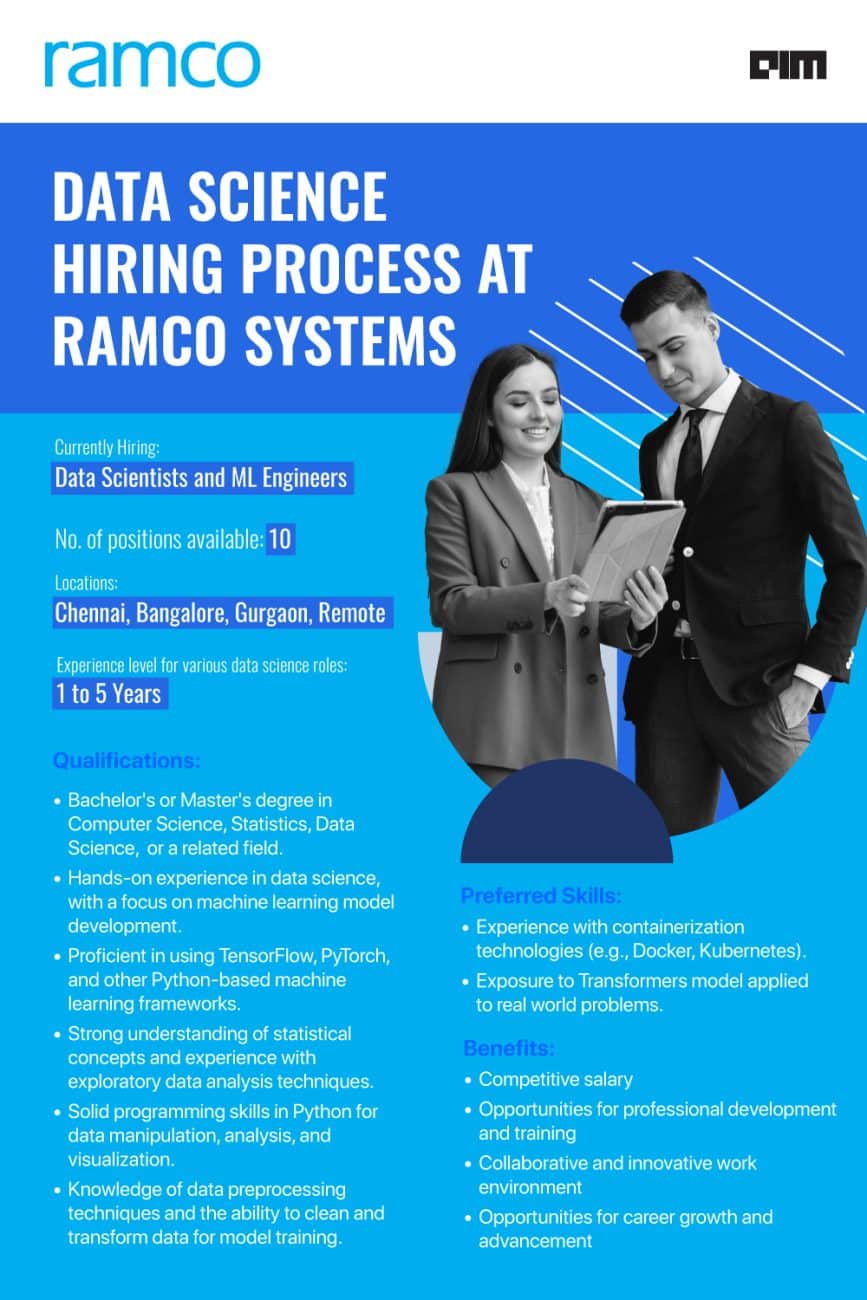
Earlier this month, leading ERP software solutions provider Ramco Systems introduced Ramco Payce, an AI-powered platform-driven payroll software to improve business payroll management.
Beyond payroll, Ramco’s AI and analytics team has successfully addressed challenges ranging from warehouse process optimisation and anomaly detection to user personalisation. Over the past five years, the team has developed and implemented chatbots using traditional NLP techniques and is now upgrading them with LLMs for enhanced capabilities.
Leveraging AI and ML, Ramco’s data science team focuses on solving practical problems through data science applications, emphasising use cases over technology-centric approaches.
AIM got in touch with Srirama Raja, chief technology officer, and Rajiv Nair, chief human resources officer and ESG leader, Ramco Systems, to understand the company’s hiring strategy in the data science space, and talk about the skills needed, expectations, and the company’s work culture, among other things.
Ramco is currently undergoing technology modernisation, incorporating deep analytics, integrating ML algorithms into product features and actively hiring for this. The selected candidates will play a crucial role in the founding team, establishing processes and procedures that will guide future generations.
It currently has 10 open positions for data scientists and ML engineers.

The role involves collaborating with cross-functional teams to translate business requirements into data science problems. You will also be needed to use your expertise in statistics and machine learning to extract insights from diverse datasets, implementing models with TensorFlow, PyTorch, and Python frameworks.
Besides, you will be required to develop and maintain models for personalised recommendations, anomaly detection, or intelligent search.
Inside Ramco’s AI Lab
The data scientist role at Ramco Systems involves working with data to derive useful insights and contributing to developing and implementing ML models. In operationalising AI and ML, the team employs Optical Character Recognition (OCR) and translation to digitise documents in various languages, facilitating information retrieval.
Their custom framework integrates conventional ML models, combining machine learning and hypothesis testing for algorithm design in Transportation Management Systems (TMS) and Warehouse Management Systems (WMS) optimisation.
“We currently use generative AI models for document translation and are rolling out an LLM for use within the company to improve productivity, enhance ideation and speed up PoC development. Customer support is another key area where we are testing generative AI capabilities,” Raja told AIM.
The team is currently developing proprietary foundational models with plans to offer specific actionable services to customers. Its tech stack is primarily Python-based, using Python packages and open-source tools that meet security standards.
“Our vision in using generative AI is developing multi-agent adversarial models with access to Vector data stores. Thus, we mainly use FAISS and PyTorch for development and TensorFlow for building deployable models while hosting them on the Triton Server,” added Raja.
Hiring Process
“The hiring process for data science roles at our company aims to balance innovation and fairness, evaluating candidates based on their learning agility, analytical thinking, and problem-solving mindset,” Nair told AIM.
The three-round interview includes a technical evaluation covering aspects such as problem-solving, foundational knowledge, project experience, programming proficiency, and communication skills. The Chennai-headquartered company prioritises candidates with strong technical skills and a collaborative approach.
The interview process begins with a technical discussion, followed by a tailored assessment to identify strengths and weaknesses. Successful candidates then proceed to a technical discussion with the business/vertical head, demonstrating technical skills and engaging with decision-makers.
Work Culture
“We prioritise a comprehensive learning environment, providing opportunities for skill development and immersion in cutting-edge technologies within a product-driven setting,” said Nair.
The focus is on cultivating proficiency and thought leadership in digital tech, accompanied by a competitive salary and support for professional growth. The work culture emphasises collaboration and innovation, fostering career advancement.
“A distinctive aspect of our work culture, particularly in collaboration with the data science team, lies in the company’s transition to modern technology. It involves integrating deep analytics and ML algorithms into product features, with selected candidates playing a vital role in establishing foundational processes for future generations,” commented Nair.
The company currently follows a hybrid working model, combining in-person and remote work for employees.
“If you have a keen interest in turning raw data into meaningful insights, solving complex problems, and contributing to innovative projects, we encourage you to consider applying for a position with us,” concluded Nair.
For more information, check out its career page here or send mail to: Careers@ramco.com.
The post Data Science Hiring Process at Ramco Systems appeared first on Analytics India Magazine.